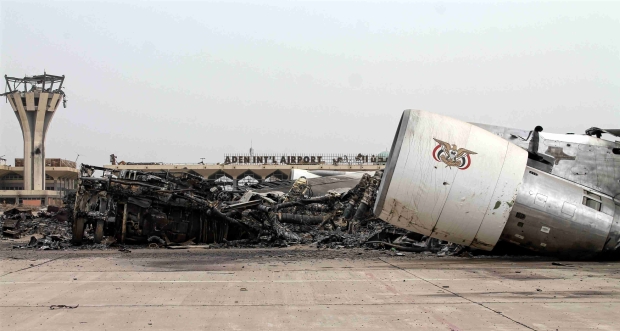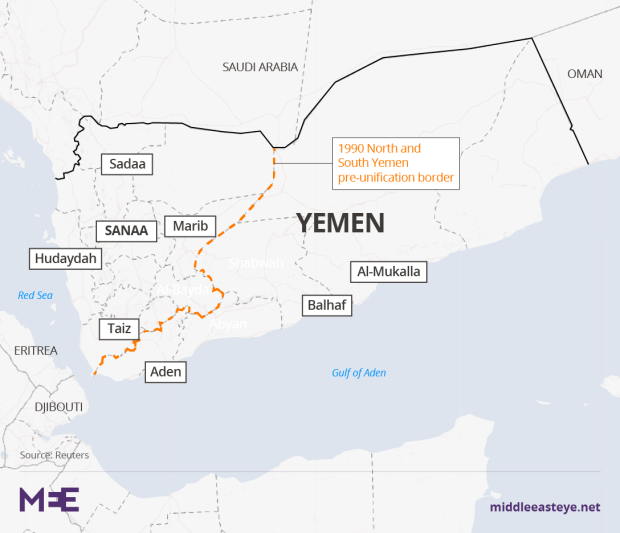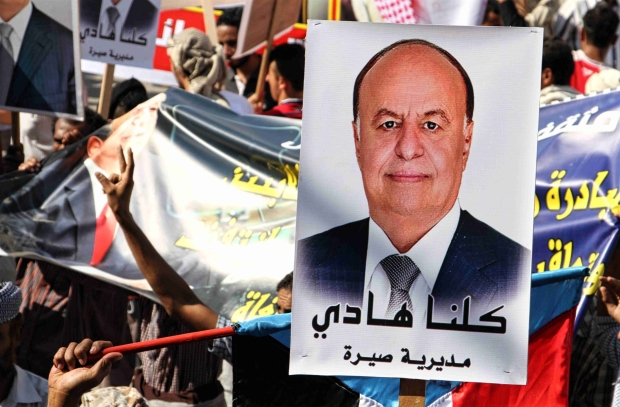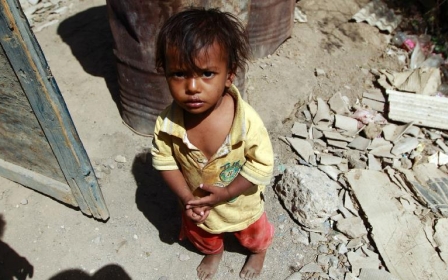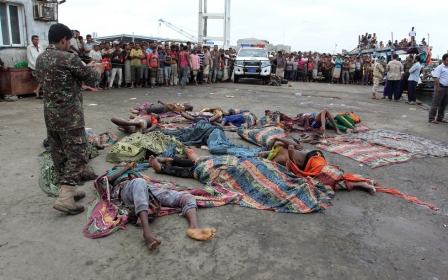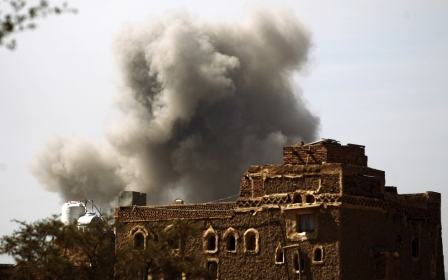Yemen war: Demands for southern independence split coalition
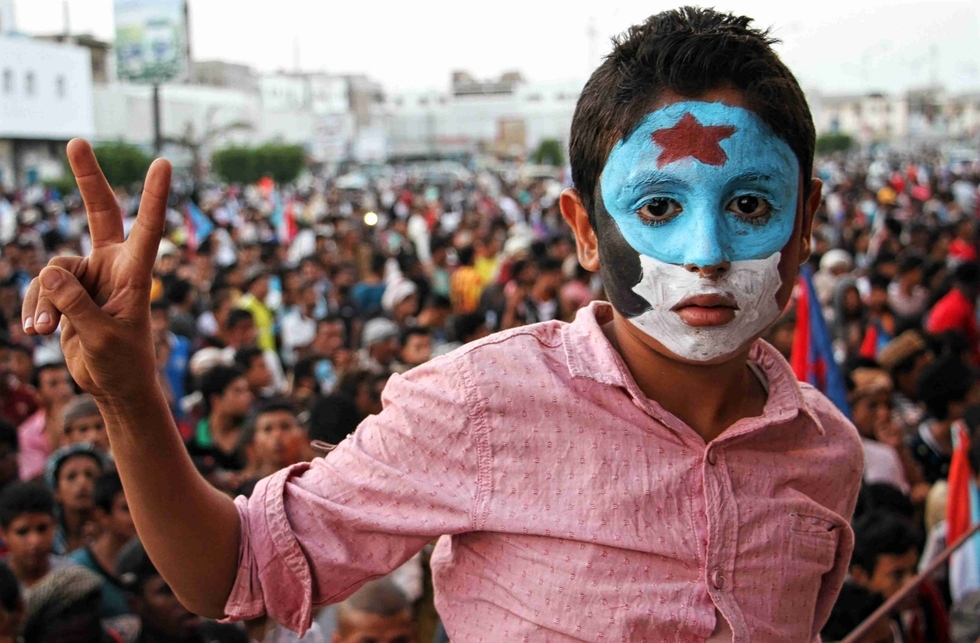
Billal al-Kelish, like many residents of Aden, fears for the future.
The port city has suffered from the fighting which has ravaged the rest of the country for the past two years, not least from March until July 2015, when the Houthi rebels occupied Aden before being driven out.
In recent months, however, the city has been relatively peaceful. People have returned to their homes, shops have reopened and government workers are paid every month.
But a new tension pervades the air, amid fears of a split within Decisive Storm, the military operation launched by the Saudi-led coalition in March 2015.
'Everyone in Aden worries about the future, as the disputes between Hadi and the Southern Movement become clear to all of us'
- Billal al-Kelish, shop owner
On one side there is the south Yemeni independence movement and the UAE, whose forces are a major presence in the city.
On the other is Yemeni President Abd Rabbuh Mansour Hadi, whose return to Aden was, in part, enabled by the UAE, which also rebuilt the al-Ma'asheeq presidential palace, his current base.
"I closed my shop for around eight months amid the war of 2015 in Aden, and I lost a cousin in the war,” recalls Kelish, 38, a store owner. “I do not want to see the same scenario being repeated in Aden.
"Everyone in Aden worries about the future, as the disputes between Hadi and the Southern Movement become clear to all of us."
Airport clash
Yemen has often been divided between the more populous north and the wealthier south, where the majority of the country’s oil wells are situated.
The country united in May 1990, when the People's Democratic Republic of Yemen (the southern portion, including Aden) joined with the northern Yemen Arab Republic (which includes the capital Sanaa). Southern independence forces were defeated during a brief two-month war in 1994.
Then, in 2007, dozens of retired soldiers staged protests calling for independence. From this grew the Southern Movement, an umbrella organisation of smaller pro-independence groups.
But amid the current conflict, the decades-old issue of independence and who runs Aden is causing cracks.
On 12 February, Hadi ordered Lieutenant Colonel Saleh al-Omairi, the commander of Aden’s airport, to leave the site. Omairi serves with the Security Belt forces, which consists of fighters from the Southern Resistance and was trained by the UAE.
The reasons for the order are unknown: what is known is that Aden airport is one of only two still functioning in the country and therefore strategically important.
Omairi refused to go, so Hadi sent in his presidential forces. The resulting confrontation engulfed the surrounding area as well as the airport itself for several hours as Emirates warplanes buzzed overhead. Eventually Hadi’s forces withdrew.
By the standards of Yemen it was uneventful: no fatalities, nine injured and buildings peppered with bullet holes. But it highlighted the tensions between the UAE and Hadi, who wants to be the main ruler of Aden.
A coalition divided
And the problem for many of the Southern Movement is Hadi. They realise he may be president of Yemen once the war ends, but fear that his past talk of a federal Yemen will not deliver an independent south.
One member of the Southern Movement told MEE: "We accepted Hadi and his government in Aden for the sake of the coalition countries, led by the UAE in Aden.
"We are sure that the coalition countries, led by the UAE in Aden, will support the independence of the south. That’s why we support them.” For its part, the UAE has not commented on the issue of independence.
Southern Movement fighters have worked with Security Belt forces, the source confirmed. Hadi does not have the authority to depose or appoint any leader of the Security Belt forces, the source added.The leaders of the Southern Movement accuse Hadi of being a "traitor" because he served as vice president to then-leader Ali Abdullah Saleh, yet during that time they failed to advance the cause of southern independence.
"We have been demanding independence since 1994, and Hadi did not support us,” the source said. “Now he wants us to support him and this is difficult for us.”
Hadi supporters: Let's wait
The airport clash was not the only incident. On 13 February, Hadi left Aden for Riyadh to meet with Saudi officials, who are more sympathetic to his cause than the UAE, and Emirati leaders to resolve the airport dispute. But the meeting was delayed.
Hadi then went to Abu Dhabi, where he met with Crown Prince Mohammed Bin Zayed al-Nahyan, deputy supreme commander of the UAE Armed Forces. The meeting received little, if any, media coverage; details only emerged two weeks later.
But Al-Quds al-Arabi, a London-based newspaper, reported on 3 March that the short meeting between Hadi and Nahyan, at which Saudi and Emirati security and intelligence leaders were present, had been ill-tempered. The newspaper cited a Yemeni source as the basis for its story.
Nahyan had told Hadi that the UAE was the only reason he had been able to return to Aden, the paper said, adding: "Our sacrifice and the blood of 65 Emirati martyrs will not go to waste."
Yet Hadi has his supporters. The Islah party, which is opposed to independence, backs him as the best option for a united Yemen.
A party member, speaking anonymously amid concerns for his safety, said that now was not the time for disputes in the coalition, given that the Houthi rebels still control parts of the south.
"I hope the coalition forces will support us and liberate the rest of the south and the whole country from the Houthis and then we can solve our disputes,” the official told MEE.
“But any disputes now will only serve the interest of the Houthis. We are not supporters of Hadi as a person, we are supporters of the legitimacy.
“If there is a referendum about independence, it should be after the liberation of the whole country from the Houthis."
And then there's al-Qaeda
UAE forces removed Omairi as the commander in charge of the airport on 28 February, following Hadi’s visit to Abu Dhabi. Forces from Sudan, another part of the coalition, then took control. The UAE still considers itself to be the main ruler of Aden.
Esam al-Shaeri, under-secretary of the Aden-based Sah Foundation for Defending Rights and Freedom, which is sympathetic to southern independence, said demands for independence predate the coalition campaign launched in March 2015.
"Independence is a demand of the people and not a demand from specific people,” Shaeri told MEE. “There can be no solution to the Yemeni crisis without a solution to the southern issue."
'There can be no solution to the Yemeni crisis without a solution to the southern issue'
- Esam al-Shaeri, Sah Foundation for Defending Rights and Freedom
He said that Decisive Storm is the best chance that the Southern Movement has of achieving independence, while also accepting that Hadi and his government are also partners in the coalition. "The south is a partner of the coalition and the presence of Hadi and his government in the south is based on this partnership," he said.
"The coalition countries have some ideas, some vision to solve the southern issue,” he said. “During the next months there will be diplomatic movement demanding a solution to the southern movement.”
But Hadi has repeatedly rejected independence. "We are going to complete steps towards federalism, which is the main solution for the current crisis,” he said in October 2016.
And in the wings is al-Qaeda, still a force to reckoned with in the south. Its fighters have taken advantage of the war between the Houthis and pro-government forces to take over some areas in Aden and other provinces
It is a danger of which Kelish is only too aware. "All of us know that there are still fighters of al-Qaeda in Aden,” he said.
“Any disputes will serve their interests and help them spread again. Fighting al-Qaeda is a priority and then there should be a solution to the southern issue."
New MEE newsletter: Jerusalem Dispatch
Sign up to get the latest insights and analysis on Israel-Palestine, alongside Turkey Unpacked and other MEE newsletters
Middle East Eye delivers independent and unrivalled coverage and analysis of the Middle East, North Africa and beyond. To learn more about republishing this content and the associated fees, please fill out this form. More about MEE can be found here.


